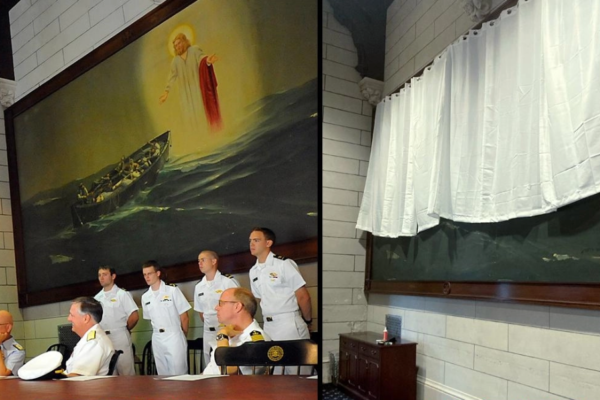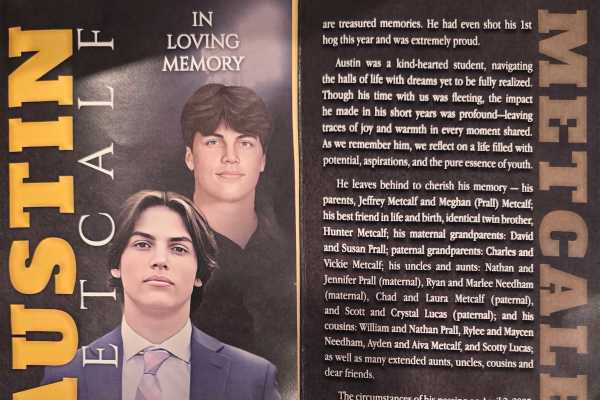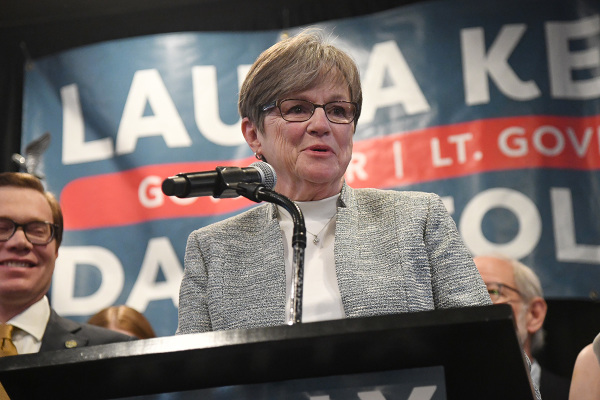How Campus Crusade and a personal relationship with Christ led one man on a mission to save lives
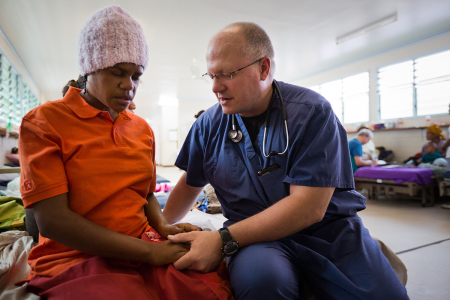
In July 2017, Dr. Allan Sawyer found himself yet again in central Togo. A long, narrow country in West Africa, Togo is home to 8 million people, nearly 82% of whom live below the poverty line, and one out of every eight children there won’t live to see their fifth birthday.
In addition to the multiple lengthy flights it took him to get to the capital city of Lomé from his home in Phoenix, Arizona, Sawyer had also endured a bone-crunching 10-hour car ride on pot-hole pocked roads to ultimately arrive at his dusty hotel. Exhausted, dirty and jet-lagged, he needed a shower and some solid sleep before he could start work in the delivery room the next morning. This was Sawyer’s fourth journey to Togo to help rural, poverty-stricken women and children as an obstetrician-gynecologist medical missionary.
Togo is a country where there are only five physicians for every 100,000 inhabitants. The average man can only expect to live to age 62, while a woman might make it to 67. It’s also an area where female genital mutilation is practiced, and the risk of death for pregnant women is 1 in 67.
This is the environment to which Sawyer willingly traveled. Where, in the middle of one dry and hot July night, his guest room phone rang and jolted him awake. “We need you in the operating room right now, doctor,” urged a heavily accented voice. He stumbled to turn on the light, and, after throwing on his scrubs, walked to the hospital in the dark of night.
The Hospital of Hope had been constructed a few years earlier and was modern by African standards. Once inside the operating room, Sawyer felt like he’d stumbled onto the set of a horror film: an unconscious woman lay on a bed, looking more dead than alive, surrounded by blood that stretched from floor to ceiling.
After a quick examination, he determined that her uterus was ruptured and that her bladder had been torn open by her infant’s large head. The baby had not survived. The woman was bleeding so heavily that Sawyer believed she probably also wouldn’t make it. Saying a prayer, he began to operate. After three hours, he still had much more to do. “I have to keep going until we’re done, or until she dies,” he thought to himself.
Several hours later, after the last stitch, Sawyer knew he’d done the best he could do with what he had. He went back to his room to catch a few hours of sleep.
When he returned to the hospital the next day, he looked all over for the woman. One of the workers said, “There she is!” and pointed to a patient who was sitting up in a bed eating breakfast. She gave him a smile, and he felt a huge relief. “You look great!” he exclaimed, contrasting the calm and smiley woman who was sitting up in front of him now with the sheer nightmare he’d walked into only the night before. He saw her every day until she was recovered enough to warrant being discharged.
The woman returned a few weeks later for a follow-up visit. “Your recovery is amazing,” he told her, stunned at how quickly she’d healed. “God saved you.” She looked at him and responded, “Well, God may have saved my life, but God taught you what to do to save it. Thank you, Dr. Sawyer.”
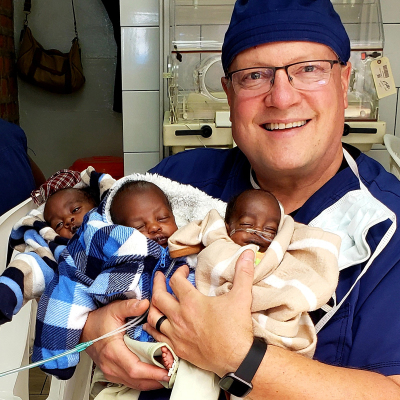
Sawyer was born at Moffit General Hospital in San Francisco. (In a bit of foreshadowing, the doctor who delivered him would be the same doctor to sign his OB/GYN board certificate over a quarter-century later!) Both of his parents were healthcare workers, and they raised him and their other son in nearby Stockton, California. After he graduated from Lincoln High School, Sawyer enrolled at Stanford University as an industrial engineering major.
One night he attended a Campus Crusade for Christ meeting after being invited by a roommate. The pastor asked the young attendees to consider several serious questions during his talk: “If you were to find yourself before the throne of God, how can you be assured of your salvation?” “Do you know what following Christ really requires?” “Why do you need a Savior?” “Has Jesus ever been the Lord of your life?”
Sawyer grew up Episcopalian. During high school he was the lead altar boy, and his family attended church regularly. Yet he’d never heard any of these questions posed before. As he listened to the pastor explain the path of salvation and studied the Bible tract he’d been given titled “The Four Spiritual Laws,” he tried to make sense of it all.
“This was all so foreign to my understanding,” Sawyer recalled. “I thought if you were baptized or confirmed and you went to church, that was all that being a Christian required. This pastor was talking about a personal relationship with Jesus when I didn’t even know that was an option.”
After spending that evening questioning his beliefs, young Sawyer decided that he did indeed need a Savior, and he prayed to receive Christ.
Sawyer, however, wanted validation for his decision. “If Christ is really inside of me, I want other people to see that and notice it,” he thought. He confided to a friend that he’d accepted Christ into his heart and that he hoped it would make a difference in how he lived his life to the point where others would see he’s a changed man.
Six months later, this friend approached him. “Someone noticed you were different!” he exclaimed. “One of the guys at the dorm just asked, ‘Hey, what’s with Allan Sawyer? We used to call him “Allan the a--hole” behind his back, and he's changed! He isn’t one anymore!’” That was a turning point for Sawyer, as he knew the Holy Spirit had changed his heart and changed how he treated people.
He began attending a local Presbyterian church where his relationship with Jesus grew. One Sunday a visiting missionary who served as a physician on overseas mission trips gave his testimony during the service. Allan felt like the physician was speaking directly to him.
“I heard the Lord say, ‘Allan, if you change your major, you could do what he is doing!’” Sawyer said. “I walked out of the church and immediately changed my major the next week to biology, which right away felt like the right decision. It was all due to that testimony and God speaking through it to me!”
Allan received his bachelor’s and master’s degrees at Stanford, and then in 1984 he headed to Oral Roberts University for medical school. Two years in, a fellow student approached Allan on campus and asked, “Excuse me sir, do you have any jumper cables? My car won’t start.” Sawyer was so smitten with the beautiful young woman that he connected the ends of the cables to the wrong terminals and blew the fuses. It was a unique beginning to a lasting relationship. In 1988, Teresa and Allan were married.
While he was in medical school, Sawyer helped a doctor — who was also a professor at Oral Roberts — deliver the baby of a couple who had struggled with infertility for years. When the baby was successfully delivered, everyone in the room was crying. Afterward, the professor asked, “Do you want to do what we just did for the rest of your life?” Sawyer nodded in the affirmative. “Then you really should be an OB/GYN,” the professor urged.
As a result of that exchange, Sawyer decided OB/GYN would be his specialty. He and Teresa moved to Phoenix, Arizona, to finish his residency training, and the hospital where he did his training asked him to stay when he was finished. He opened his own OB/GYN practice and Teresa acted as its finance manager.
In 2003, a doctor friend who did medical missions through Samaritan’s Purse recruited Sawyer to join him on some medical trips. Remembering the physician’s testimony he heard in college that had led him to change his major, Sawyer was intrigued.
“He wanted me to go to Papua New Guinea with him for a three-week trip. I asked, ‘What will we do?’ He answered, ‘I can’t explain. Just go with me.” When Sawyer and the Samaritan’s Purse doctor arrived in country, they found only a handful of physicians working in the entire hospital. “We saw hundreds of people with all kinds of ailments. But that was it for me; I knew I had found an organization where I could use my skills for God’s glory in a new way.”
Sawyer returned to Papua New Guinea in 2005, and the following year he served at a hospital in Kijabi, Kenya. When asked why he feels especially called to go to Africa, he responded:
There’s just simply a sparsity of trained physicians in sub-Saharan Africa. There are many countries where there’s one general surgeon for every 2.5 million people and one OB/GYN for every 4.5 million people. Also, most hospitals there want to be paid upfront, so patients will die on the stairs because they can’t pay. They oftentimes have to live with their pain. I hear the word “Inshallah” a lot, which means “if Allah wills it.” They accept that’s the way it is and just live with it. But it’s an incredible hardship.
Sawyer began going on more trips overseas. “We started going every year, then multiple times per year. But that’s hard to do when I’m in private practice,” he said.
In 2017, Sawyer sold his practice, primarily to have the ability to serve on medical mission teams full time.
“After I closed my practice, we went out with some friends who asked what made me decide to do that. I answered, ‘70 percent God called me, and 30 percent frustration with U.S. medicine.’”
Sawyer explained that his frustration stems from witnessing the rising cost of U.S. healthcare yet seeing the number of physicians remain about the same. “The for-profit model of healthcare has switched from something that was benevolent to a money-making machine,” said Sawyer. “That is just not for me.”
However, Sawyer still works covering shifts at the Phoenix hospital, fulfilling board certification requirements so he can keep his U.S. medical license, which in turn ensures that he can practice overseas.
“I enjoyed my private practice. My wife is still the finance manage for the doctors who purchased my practice. Because she had kept it running so smoothly for so many years, the doctors who bought the practice wanted to keep her on!”
By the time Sawyer left his practice, he had delivered over 11,000 babies.
Sawyer has now served on medical teams to Papua New Guinea, Kenya and Togo a total of five times each. He’s been to Zambia on three occasions, as well as to Cameroon and Uganda.
When asked why he loves serving on overseas medical mission teams, Sawyer responded:
"So often I’m dealing with people who have lost all hope. We give them the hope of Jesus. Samaritan’s Purse President Kenny Isaacs says, 'The quality of our service is the platform for our witness.' To me, giving people excellent medical care while being the hands and feet of Jesus for patients who can’t pay for care, in their eyes has earned you the right to share the Gospel with them. It is the ministry of medicine which opens the door to the Gospel with these patients.
Sawyer raises his own support through Samaritan’s Purse, and he also fundraises for facility upgrades at the African hospitals where he serves.
Romans 15:13 is Sawyer’s favorite Bible verse. “May the God of hope fill you with all joy and peace as you trust in him, so that you may overflow with hope by the power of the Holy Spirit.”
“Being an OB/GYN doctor is so faith-affirming," he added. "Giving that hope to people who have lost it, and doing it in Jesus’ name, is such a privilege.”
He also recalled a patient in Togo who was facing a female problem that very few doctors in the entire country had the ability to resolve.
"She’s a great example because it was a complex case. I was standing across the operating table from a local tradesman turned surgical scrub technician who was assisting me. I asked him, 'Do you like your job?' and he said, 'So much! Because I get to see miracles with my own eyes every day.' I’ll bet the operation and her survival does look like a miracle to him, and it is. And witnessing a miracle produces hope."
Teresa Sawyer has remained a tireless supporter and helpmate of her husband and of his God-given passion to help those who lack access to adequate healthcare overseas.
Recently, they celebrated their 34th wedding anniversary. They have two sons who are now 27 and 30 years old. In 2002, the couple went to China where they were blessed to adopt identical twin daughters. Both girls are now juniors in college and are thriving. A few years ago, the couple's eldest son, Michael, married a woman whom his father had delivered 24 years prior, bringing his work full circle.
In Fall 2021, while Sawyer was working in the operating room of a hospital in rural Kenya, he had the incredible opportunity to deliver triplets and a set of twins on the same day.
“To have triplets survive in sub-Saharan Africa is rare,” said Sawyer. “I was just so thrilled that I could help manage this high-risk pregnancy and delivery, and blessed to witness that miracle. They’re doing well. I stay in touch with their grandmother, and I’m just so pleased those boys will have a strong chance at a good life.”
When asked what motivates him to continue going on medical mission trips to far-flung locales when he could stay in his comfortable, familiar surroundings, Sawyer answered:
In the movie Chariots of Fire, there’s a scene where the Olympic sprinter Eric Liddell is talking to his sister, Jenny, in Scotland, discussing their return as missionaries to China. He tells her that he does intend to return, but first he wants to run in the Olympics. “I believe God made me for a purpose. But he also made me fast. And when I run, I feel His pleasure.” I think God has given me skills and an aptitude for this work, and when I go serve on missions where I care for people and deliver their babies, I feel God’s pleasure.
Recently, Sawyer attended a ceremony at his old high school, Lincoln High School. The purpose was to recognize and formalize his induction into the Hall of Fame for his work overseas. He enjoyed that event and felt very honored by the gesture. But we know that a higher ceremony awaits Sawyer — the one at the end of his life that will be announced by the angels, welcoming their “good and faithful servant” into the Kingdom.











